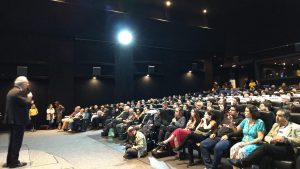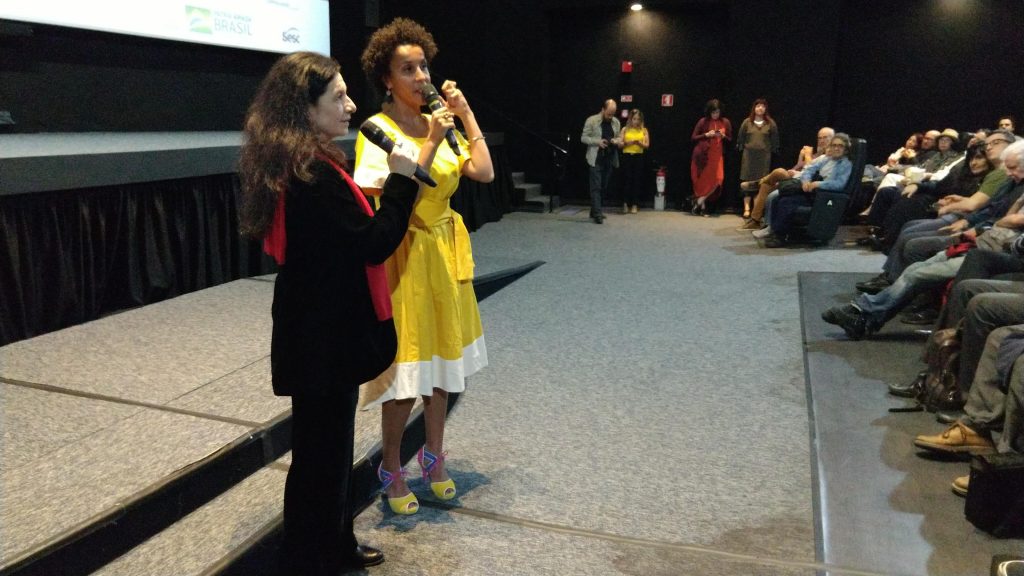São Paulo – Out of the 12 movies of the 14th Arab World Film Festival, seven were directed by women. The festival kicked off on Wednesday (7) at CineSesc in São Paulo and will run until August 14 there. The, the festival will come back from October 16 to 28, with a special schedule of 20 movies at Centro Cultural Banco do Brasil (CCBB-SP).
The event is held by the Institute of Arab Culture (Icarabe) and the Social Service of Commerce (SESC-SP), with sponsorship from the Arab Brazilian Chamber of Commerce, the Federation of Muslim Associations in Brazil (FAMBRAS) and Instituto do Sono. Four of the movies were never shown in Brazil. Arab Brazilian Chamber president Rubens Hannun, Foreign Relations vice-president Osmar Chohfi and cultural director Silvia Antibas attended the opening ceremony.

“For the 14th year, we are very glad and honored. I thank the partnership with ICArabe. I would also like to say this is an extremely important festival that fits perfectly with the Chamber’s mission, which is to connect Arabs and Brazilians for the economic, social and cultural development, so it has an instrumental role,” Hannun pointed out in his speech at the event’s opening.
The festival’s curator and ICArabe cultural director Arthur Jafet explained the female prominence came naturally. “It wasn’t our intention that it was assigned like this (most of the movies produced by women). They were chosen by their quality. They were selected because of their great performance in festivals and it happened to have seven women,” Jafet told ANBA.
The curatorship was divided into three main themes: The “Flame of insurrection,” about the political demands from people to states; “Memory,” about people who were away and now revisit their countries; and “Refugees,” about the displacement crisis.
“Despite the huge diversity of 22 countries composing the Arab world, the culture, customs, politics and lifestyle of these nations are still looked upon through a negative, simplistic stereotypical lens,” Jafet said. “The cinema is not free from suffering with misinformation and lack of understanding, especially when we’re not talking about Hollywood productions. The importance of a festival is exactly to save these movies from not being known by the public. In the case of Arab movies, this becomes a mission,” he added.
Silvia Antibas believes the event is extremely important to show the cinema creation and the Arab cultures. “It’s very diverse, each region has a specialty. It’s important to show, to get to know the other, and being known. It’s only knowing each other that we can respect and be respected,” she said.
Sofia Djama
The opening of the festival featured the Algerian filmmaker Sofia Djama (pictured above in the yellow dress). The director of the move that was screened at the first day of the festival, “The Blessed,” thanked the invitation for movies produced in country such as Morocco, Tunisia and Algeria. “First of all, I’d like to thank the festival for inviting many movies from Maghreb. When we say Maghreb, we mean the Arab world, but of course Africa and Mediterranean too,” she explained.
The Algerian believes that the screening at a theater such as CineSesc, which hosts independent cinema, is an act of activism. “And you, dear audience, are those who make theaters that show the independent cinema resist. Please, keep going to the movie theaters. Bring your children and grandchildren, because this is a resistance against populism,” the director said.
Sofia believes that culture is made of cycles, and she explained what marked her experience. “I belong to a generation in Algeria that did not know movie theaters. However, here I am introducing my movie. How can this miracle happen? Because there are people that convey such an unconditional love for the cinema,” she concluded. Her production tells the story of two generations living in a context of civil war.
Quick facts
14th Arab World Film Festival
Until August 14
Cinesesc
Rua Augusta, 2075
Cerqueira César, São Paulo
Ticket prices: BRL 3.50 – BRL 12
Festival website
Check the full schedule at the story Four movies set to premiere in Arab World Film Festival
Translated by Guilherme Miranda




